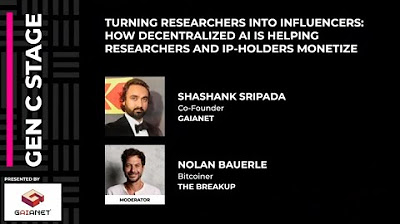If artificial intelligence takes your job, AI should pay you, argues actor
Summary
TLDRJoseph Gordon-Levitt addresses the implications of AI in the entertainment industry, emphasizing the need for fair compensation for creators whose work fuels AI technology. He highlights that while AI can potentially produce films indistinguishable from human-made ones, many behind-the-scenes workers face significant financial insecurity due to ongoing strikes. Gordon-Levitt calls for legislative action to protect workers across all sectors from being replaced by AI, stressing that as technology advances, the line between AI-generated and human-created content will blur, raising critical questions about creativity and labor rights.
Takeaways
- 😀 AI technologies are raising significant concerns in the entertainment industry, particularly among writers and actors.
- 😀 Joseph Gordon-Levitt argues that if AI generates content using human-created data, those original creators deserve compensation.
- 😀 The notion that AI can produce human-level work at a low cost hides the fact that it relies on extensive training data generated by people.
- 😀 Many individuals in the entertainment industry, especially behind-the-scenes crew members, are facing financial instability due to the strike.
- 😀 The strike involves not just high-profile actors but also many who depend on fair compensation to support their livelihoods.
- 😀 AI does not create original material but rather recombines existing data produced by human creators.
- 😀 The potential for AI to use actors' images indefinitely raises questions about fair compensation and rights.
- 😀 Negotiations regarding AI compensation are ongoing, but there is a need for legislation beyond what labor unions can address.
- 😀 Joseph emphasizes that the issue of AI affecting jobs spans multiple industries, including healthcare.
- 😀 The advancement of AI technology suggests that distinguishing between human-made and AI-generated films may soon become impossible.
Q & A
What is the main concern Joseph Gordon-Levitt raises regarding AI in the entertainment industry?
-Joseph Gordon-Levitt is concerned that AI technologies, which can generate content, rely heavily on data created by human workers. He argues that those who produce this data should be compensated when AI monetizes their work.
How does AI generate content, and why does Gordon-Levitt believe this should lead to compensation for creators?
-AI generates content by being trained on vast amounts of data created by humans, such as movies, scripts, and performances. Gordon-Levitt believes creators should be compensated because their work is essentially being used to 'train' the AI, allowing it to generate new content.
What specific example does Gordon-Levitt use to explain the need for residuals in the AI-generated content?
-Gordon-Levitt uses the example of AI potentially generating complete feature films at the click of a button. To train such an AI, a vast number of past movies would be required, and he believes the creators of those movies should receive residuals for any AI-generated films that make money.
What is the central argument regarding the relationship between human labor and AI in the script?
-The central argument is that AI cannot create anything on its own; it only recombines and reconfigures data produced by human workers. Therefore, human creators whose data is used to train AI should be compensated for the AI's outputs.
Why does Gordon-Levitt emphasize that this issue is not just about Hollywood?
-Gordon-Levitt emphasizes that the issue of AI impacting jobs goes beyond Hollywood because other industries, such as healthcare, may also see job displacement. He uses the example of doctors’ medical records being used to train AI, potentially leading to the loss of their jobs.
What does Gordon-Levitt suggest should be done to address the issue of AI in labor?
-Gordon-Levitt suggests that AI regulation should be handled through legislation rather than by labor unions alone. He believes it is a matter that requires national attention and legal measures to ensure fair compensation for those whose work is used to train AI.
How does Gordon-Levitt describe the potential future of AI-generated movies?
-Gordon-Levitt predicts that AI-generated movies will soon be indistinguishable from movies made by humans. The technology is rapidly improving, and it will become difficult to tell the difference between AI-created content and human-made content.
What does Gordon-Levitt say about the financial impact of the strike on workers in the entertainment industry?
-Gordon-Levitt highlights that the strike impacts not only high-profile actors but also the lower-profile workers who are essential to production, such as crew members. These workers may lose their homes and health insurance if the strike continues.
What is Gordon-Levitt's stance on the role of AI in creative industries?
-Gordon-Levitt is wary of AI's growing role in creative industries. He believes that while AI can assist in content creation, the work it generates ultimately relies on human creativity and labor, and those creators deserve compensation.
How does Gordon-Levitt compare the impact of AI on entertainment to other industries?
-Gordon-Levitt draws parallels between the entertainment industry and other sectors, such as healthcare, where AI could potentially displace workers by using data (e.g., medical records) created by professionals. He stresses that AI's impact is widespread and not limited to entertainment.
Outlines

此内容仅限付费用户访问。 请升级后访问。
立即升级Mindmap

此内容仅限付费用户访问。 请升级后访问。
立即升级Keywords

此内容仅限付费用户访问。 请升级后访问。
立即升级Highlights

此内容仅限付费用户访问。 请升级后访问。
立即升级Transcripts

此内容仅限付费用户访问。 请升级后访问。
立即升级5.0 / 5 (0 votes)






